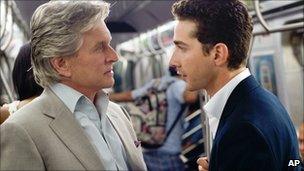Can Hollywood do the banking crisis?
- Published

Michael Douglas's ruthless financier Gordon Gekko returns to cinema screens this autumn
"My father used to say they didn't make movies about people who work," remarked Hollywood director Oliver Stone in a recent interview about his new film - the long-awaited follow-up to the 1987 banking classic Wall Street.
As a rare foray for Hollywood into the world of company boards and chief executives, Wall Street created the defining image of the financial industry and the ruthless work ethic of the 1980s.
"Greed, for want of a better word, is good," proclaimed Michael Douglas as Gordon Gekko, and the stereotype of Wall Street bankers was born.
Since then, the worlds of finance and business appear to have fallen out of fashion with Hollywood producers.
But following the full force of the global financial crisis, "movies about people who work" could suddenly be back in vogue.
Stone's Wall Street sequel, Money Never Sleeps, hits cinemas next month, delivering the director's critique of the crisis and the people who caused it.
The credit crunch theme also runs though several other films that have done the rounds at major film festivals in recent weeks, hoping to engage weekend cinema audiences with the world of collateralised debt obligations and sub-prime mortgages.
Even aside from the crisis, 22 October will see an even more unlikely business offering hitting the big screens: A big-budget Hollywood take on the founding of Facebook.
The Social Network (tagline: You don't get to 500 million friends without making a few enemies) has big names behind it in the shape of Fight Club and Se7en director David Fincher and former pop star Justin Timberlake.
But this renewed flirtation between Hollywood and the business world might well be short-lived, film historians warn. And in any case, the films made about the financial crisis are unlikely to be any good.
'Too raw'
Business, they point out, isn't really the focus of these films at all.
"When Hollywood makes films about business, it nearly always uses business as a backdrop to tell another story," says Edward Gallafent, a researcher at the Department of Film & Television Studies at Warwick University.
Business, he argues, rarely warrants the direct attention of a Hollywood film, even following something as dramatic as the near-collapse of the banking sector.
"Wall Street 2 is very much like a family melodrama. The Facebook movie looks like a melodrama about friendship and betrayal.
"Both are about business indirectly, but the business end of it just isn't very dramatizable."

Justin Timberlake stars in a big budget production of the story of Facebook
This, Mr Gallafent argues, is why most of the films being made about the financial crisis will be documentaries rather than feature films.
Furthermore, expensive financial crisis-themed features may struggle to attract the funding they need from big businesses who either do not have the money to spend or are the very companies being portrayed in a less-than-favourable light.
Goldman Sachs are unlikely to have helped fund the new Wall Street film, which instead relies on the star power of Oliver Stone and Michael Douglas.
Even those credit crunch films that have been made struggle to analyse in any depth what happened, and what the impact on America in particular was, Edward Gallafent argues.
Up In The Air, the 2009 George Clooney film about a travelling businessman is one example.
"If you dissect Up In The Air, it's actually a very depressing film about American culture, about some of the effects the financial crisis had on Americans that are depressing and upsetting," he says.
"But it's essentially a comedy vehicle for George Clooney, because the issues are just too current and too raw [to address directly].
Business lessons
Dr Allegre Hadida, who uses film to teach business strategy at Cambridge University's Judge Business School, argues that the financial crisis presents a much more fundamental problem for film-makers because it doesn't fall into the traditional Hollywood mould.
"The traditional narrative model of Hollywood has always been the success story, so it's difficult to continue with that when all you have is disaster," she says.
But despite its unease with business stories, Dr Hadida agues, Hollywood may actually reflect the business world much more accurately than first appears.
When teaching business students about strategy, she employs films such as Francis Ford Coppolla The Godfather trilogy and David Fincher's Fight Club to help convey valuable business lessons.
The Godfather deals with the common problem of succession in a family business. Fight Club defines 1990s consumerism and ad-driven society.
Others are more identifiably business films.
The 1951 classic The Man In The White Suit has plenty to say on innovation, strategy and marketing, and Walter Lang's Desk Set, released in 1957, is an ominous prediction of the power of management consultants in the modern work place.
That's not to mention the likes of the Coen brothers' The Hudsucker Proxy, or Glengarry Glen Ross, or even the groundbreaking Citizen Kane.
So if Hollywood films about business can rank among the best films of all time, why hasn't the financial crisis proved the goldmine for Hollywood that, for example, Vietnam was for film makers like Francis Ford Coppola, Oliver Stone and Stanley Kubrick in the 1970s?
One factor could be time. As Warwick University's Edward Gallafent points out, the great Vietnam films were largely made several years after US involvement in the war had ended.
"You couldn't have made Apocalypse Now in 1972," he argues. "It was just too recent."
For American film-makers, the scars of the recession may still be too raw to touch.
- Published14 May 2010
- Published1 September 2010